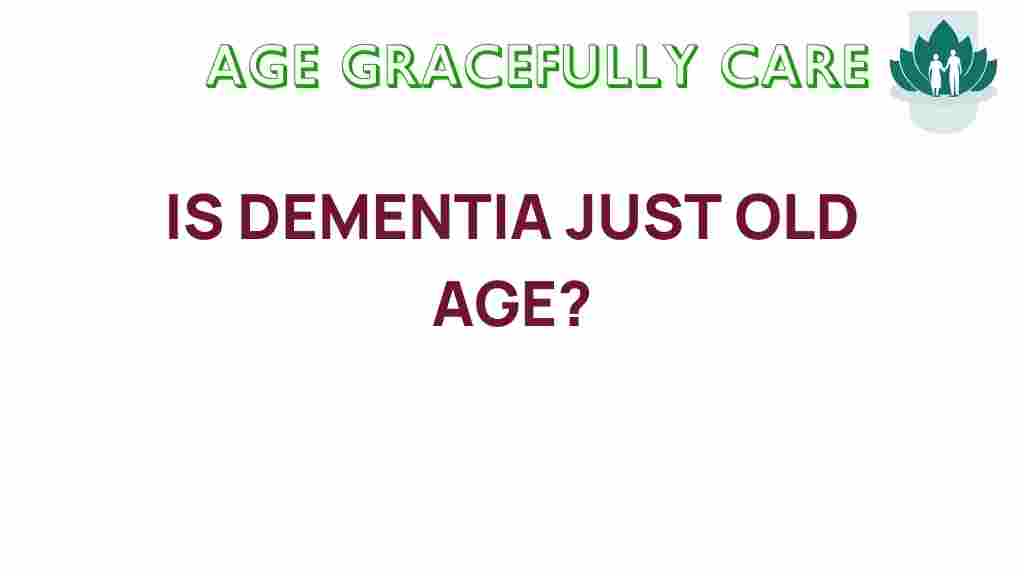Is Dementia a Natural Part of Aging or Something More?
Dementia is a term that refers to a range of neurological disorders characterized by cognitive decline, memory loss, and changes in mental health. As our population ages, understanding the relationship between dementia and aging becomes increasingly important. While many people believe that dementia is a natural part of growing older, the reality is much more complex. This article will delve into the nuances of dementia, its impact on the elderly, and the broader implications for health and wellness in senior care.
The Connection Between Dementia and Aging
As we age, our brains undergo various changes. However, not all cognitive decline is indicative of dementia. Here are some key points to understand:
- Cognitive Decline: While some degree of cognitive decline can occur with aging, it does not necessarily lead to dementia. Many seniors maintain sharp mental faculties well into their later years.
- Dementia Types: Dementia encompasses several conditions, including Alzheimer’s disease, vascular dementia, and Lewy body dementia. Each of these disorders has distinct causes and symptoms.
- Risk Factors: Age is a significant risk factor for dementia, but genetics, lifestyle choices, and cardiovascular health also play critical roles.
Understanding Dementia: More Than Just Aging
Dementia is often misunderstood as a mere byproduct of aging. Here’s a closer look at its complexities:
- Neurological Disorders: Dementia results from damage to brain cells, which can occur due to various neurological disorders, not just aging.
- Memory Loss: While memory loss is a hallmark of dementia, it can stem from other causes, such as depression or vitamin deficiencies.
- Mental Health: Mental health issues, including depression and anxiety, can mimic or exacerbate the symptoms of dementia.
Signs of Dementia vs. Normal Aging
It’s crucial to distinguish between typical cognitive changes associated with aging and the early signs of dementia. Here are some comparisons:
| Typical Aging | Signs of Dementia |
|---|---|
| Occasional forgetfulness | Consistent memory loss affecting daily life |
| Slower processing speed | Difficulty with familiar tasks |
| Minor trouble finding words | Significant language difficulties |
| Occasional confusion | Disorientation to time and place |
Factors Contributing to Dementia in the Elderly
Several factors can contribute to the development of dementia among the elderly:
- Genetics: Family history can increase the risk of certain types of dementia.
- Health Conditions: Conditions such as diabetes, heart disease, and stroke can elevate the risk of developing dementia.
- Lifestyle Factors: Poor diet, lack of exercise, smoking, and excessive alcohol consumption are linked to higher dementia rates.
- Social Isolation: Loneliness and lack of social engagement can negatively impact cognitive health.
Promoting Senior Wellness to Combat Cognitive Decline
To promote better mental health and potentially reduce the risk of dementia, seniors and caregivers can adopt various wellness strategies:
- Regular Exercise: Engage in physical activities like walking, swimming, or yoga to enhance brain health.
- Nutritious Diet: A balanced diet rich in fruits, vegetables, whole grains, and healthy fats supports cognitive function.
- Mental Stimulation: Activities such as puzzles, reading, and learning new skills can help keep the mind sharp.
- Social Engagement: Staying connected with friends and family can reduce feelings of loneliness and support cognitive health.
Steps for Caregivers: Supporting Those with Dementia
If you are caring for someone with dementia, consider these steps to provide effective support:
- Educate Yourself: Learn about dementia and its effects on behavior and cognition.
- Create a Safe Environment: Make adjustments to the living space to minimize hazards and confusion.
- Communicate Clearly: Use simple language, maintain eye contact, and be patient during interactions.
- Encourage Daily Routines: Establishing daily routines can provide structure and comfort for individuals with dementia.
- Seek Professional Help: Don’t hesitate to consult healthcare professionals for guidance and support resources.
Troubleshooting Common Challenges in Elderly Care
Caring for an elderly person with dementia can present unique challenges. Here are some common issues and potential solutions:
- Behavioral Changes: If the person exhibits aggression or withdrawal, try to identify triggers and provide a calming environment.
- Communication Barriers: Use non-verbal cues and be patient. If they struggle to respond, give them time to process.
- Managing Medication: Keep a medication schedule and use reminders to help ensure they take medications on time.
- Maintaining Independence: Allow them to perform tasks they can still manage, with assistance as needed, to promote dignity.
Conclusion: Understanding Dementia in the Context of Aging
In conclusion, while dementia is often associated with aging, it is not an inevitable part of the aging process. Understanding the differences between normal cognitive changes and the early signs of dementia is crucial for effective elderly care and maintaining senior wellness. By promoting a healthy lifestyle, encouraging social engagement, and providing appropriate support, we can help mitigate the risks associated with dementia.
For more information on cognitive health and elderly care, consider visiting this resource. If you suspect a loved one is experiencing cognitive decline, seek professional advice from a healthcare provider. Addressing these issues early can lead to better outcomes for seniors and their families.
This article is in the category Health and created by AgeGracefullyCare Team
